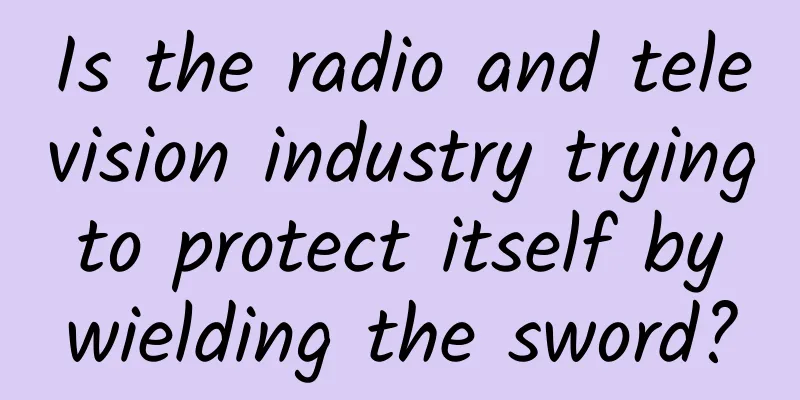Is the radio and television industry trying to protect itself by wielding the sword?

|
Three or four years ago, when various trace elements such as television, Internet, OTT TV, multi-screen interaction, three-network integration, and smart home were constantly colliding, no one imagined that an enormous nuclear fusion was constantly gathering. This nuclear fusion was finally released in the middle of 2014. The year 2014 was jokingly called "the radio and television are very busy" by people inside and outside the industry. This reminds DWRH.NET of Jay Chou's song "Cowboy is Very Busy". Indeed, from shutting down the live broadcast and playback functions on Internet TV, to restricting the broadcast of overseas dramas, and then to requiring all TV APP applications of video websites to be removed from the shelves, it can be said that every punch hits the pain point. For a time, the radio and television station became the target of public criticism and condemnation. Video websites and users cursed, the platform owners and license holders were also secretly unhappy, and even passers-by like A, B, and C heard the news and cursed a little to satisfy their desire. Insults are useless, we must solve the problem in the end. So, what exactly is the reason that the State Administration of Radio, Film and Television is willing to bear the infamy and forcibly castrate the booming Internet TV in this way? Exploring this issue is of great benefit to understanding and judging the future development of Internet TV. Fusion Network | DWRH.NET would like to take this opportunity to talk about our views. Is it really to protect the interests of TV stations and cable TV? Amidst all the criticism, the view that radio and television organizations have used policy barriers to buy a time window for TV stations and cable TV has become the mainstream. It is undeniable that the rapid popularization of the Internet and mobile Internet has indeed diverted a large number of traditional TV users, especially the development of Internet TV has exacerbated this process, prompting more and more people to obtain video resources through the Internet, and the large-scale cable TV network of radio and television has gradually become useless. But the decline of TV stations and cable TV has been going on for a long time, so there is no need to rush. Moreover, the radio and television industry is definitely not short of talented people, and it is definitely not a problem to formulate a temporary solution or a long-term strategy. Why did it arouse public anger this time? Is the radio and television industry really protecting the interests of TV stations and cable TV? Or is it that Xiang Zhuang dances with a sword to target Pei Gong? Perhaps understanding this common sense will help us unlock the answer. The State Administration of Radio, Film and Television is the functional management agency of my country's radio and television industry, and TV stations are public institutions directly under the corresponding local governments. You know public institutions, right? Although employees in public institutions also have to sign contracts, their expenses are funded by the national fiscal budget, and they have no worries about food and clothing, and they will never be laid off. As for cable networks, as operating companies of cable TV networks in various places, those that can go public have already gone public, and those that cannot go public or cannot go public are being listed and those that are about to go public are being integrated. Now that we are clear about these relationships, let’s take a look at how the State Administration of Radio, Film and Television “protects” TV stations and cable TV. Let's talk about TV stations first. In recent years, they have continuously introduced various new policies. For example, one is to limit advertising. This is the God of Wealth for TV stations. If advertising is limited, where can TV stations find pocket money? The second is to limit insertion. No advertisements are inserted at the climax of the drama. Even if the ending is to go to the toilet, advertisers will not allow it! The third is to limit the subject matter. Tearing the Japanese apart every day is easy to make people aesthetically fatigued. If this is not allowed to be filmed and that is not allowed to be broadcast, who will watch TV? Let's talk about cable TV network. One of its business income sources is cable TV network viewing maintenance fee. As an aside, the name of this fee is really long, and ordinary people can't remember it at all. Cable TV network operators across the country should find a way to make a popular name. Well, Fusion Network | DWRH.NET will simplify it as cable TV fee in this article. This fee is more than 20 yuan a month. The State Administration of Radio, Film and Television also restricts foreign and private capital from entering, and only allows programs from CCTV, satellite TV and provincial TV stations to be broadcast. If it doesn't cater to the appetite of the rich and the petty bourgeoisie, I'm afraid no one will pay 20 yuan. Now, it would seem unprofessional to say that the State Administration of Radio, Film, and Television is using policy barriers to buy a time window for TV stations and cable TV. The combination of Internet and television should develop in a balanced way What is the purpose of the SARFT's violent swinging of the sword of Damocles? This has to start with the background of the SARFT's rectification of China's Internet TV industry in 2014. In recent years, OTT TV has developed rapidly, and the size of the terminal market outside the supervision, especially the OTT set-top box market, has increased dramatically, and illegal content has flooded. According to the latest statistics from DWRH.NET, as of September 2014, the total shipment of OTT set-top boxes in China has exceeded 45 million. This data includes the sales of some counterfeit set-top boxes in addition to the sales of regular box companies. DWRH.NET believes that this is just a conservative data. Before the new Internet TV policy was so strict, some regular set-top box companies, such as Xiaomi and Vision, had used various methods to deploy terminals in non-three-network integration pilot areas and cities. Driven by profit, companies have more and more room for the development of the OTT TV industry, with cross-border integration, capital alliances, and business restructuring. A large number of programs produced by video websites or even uploaded by netizens, as well as Internet programs secretly purchased from overseas by various commercial organizations are continuously entering users' televisions. Television content is also gradually becoming outside the scope of regulation. A large number of pornographic, bloody, violent, and socially detrimental images and speeches, and even those intended for ideological infiltration by other countries, are flooding the screen. The emergence of this phenomenon poses a severe challenge to the country's network information security, and is also seriously contrary to the ultimate goal of emerging media construction in the national cultural development strategy of "enhancing the overall strength and international competitiveness of culture, resisting cultural infiltration by international hostile forces, and safeguarding national cultural security." Radio and television have multiple attributes, one of which is that they are mainly public welfare and have a mouthpiece function. As a new thing, Internet TV is bound to be subject to corresponding constraints in terms of content, platform, terminal, market access, etc. Internet TV needs to develop within the space stipulated by policies. We cannot let the entire TV screen break free from the reins of policy jurisdiction and become a free market and open place accessible to ordinary people just because OTT has achieved an easy overhead pass from a technical level. This cannot happen. The scale of Internet information regulation is similar around the world Cyber security is an important part of national security strategies of all countries. China has also made great efforts to strengthen Internet supervision in recent years. In particular, in 2014, on the 20th anniversary of China's access to the international Internet, the country made a bold and colorful contribution to the field of cyber security from a strategic level with unprecedented height and strength. Internet TV is a new thing that is the combination of the Internet and television, and it is also an extension of the Internet industry. Combined with the industry background and social background of the incident, it is natural to find the fundamental motivation of the State Administration of Radio, Film and Television's rectification this time, that is, focusing on the strategic height of national network information security, and comprehensively and thoroughly rectifying television screens from the aspects of cultural content security and public opinion propaganda position control. Perhaps you will ask, is this another Chinese characteristic? It is by no means a Chinese characteristic to regulate Internet information. The United States, which loudly advocates "Internet freedom", has never relaxed its prevention and control of the Internet. Especially after the "9?11" incident, in order to prevent possible terrorist attacks, the United States passed two laws related to Internet communication, the "Patriot Act" and the "Homeland Security Act". Through these two laws, public information on the Internet, including private information, can be monitored when necessary. In addition, the United States has also revised the "Federal Criminal Law" and the "Communications Act of 1934", authorizing national security and judicial departments to monitor telephone calls, conversations and electronic communications involving computer fraud and abuse, and allowing electronic communications and remote computer service providers to provide users' electronic communications to government departments in certain emergencies, so that the government can control first-hand Internet information related to national security. What is even more unimaginable is that the United States has also forcibly blocked websites in other countries. During the US-Iraq War, the application and resolution of Iraq's top-level domain name ".iq" was terminated, and all websites with the suffix ".iq" disappeared in an instant; in 2004, Libya and the United States had a disagreement on the management of top-level domain names, and Libya disappeared from the Internet for three days; in 2009, the United States used the excuse of "supporting terrorism" to cut off MSN instant messaging in Cuba, Iran, Syria, North Korea, Sudan and other countries, creating a precedent for information sanctions. In the same year, the United States established the National Communications and Network Security Control Joint Coordination Center to coordinate and integrate the six major network operation centers under the Department of Defense and the Department of Homeland Security, and regulate the Internet through legislation. The Communications Conduct Correction Act, the Protection of the Internet as a National Asset Act, the Information Security and Internet Freedom Act, and the Children's Online Protection Act are all major laws and regulations for regulating the Internet. Taking the Child Online Protection Act as an example, once someone is found to be producing, possessing and disseminating child pornography, they will be prosecuted immediately. If they download child pornography online and save it on their computer, they will also be convicted. The regulation of video content is not unique to China. In various countries around the world, there are corresponding management agencies that carry out strict supervision - the United States has the FCC (full name of the Federal Communications Commission, an independent agency of the US government, directly responsible to Congress); the United Kingdom has OFCOM (a regulatory agency formed by the integration of the Telecommunications Administration, the Radio Communications Administration, the Independent Television Commission, the Radio Administration, and the Broadcasting Standards Committee); Canada has the CRTC (full name of the Canadian Radio-television and Telecommunications Commission); Singapore has the Ministry of Information, Communications and the Arts; although Japan does not have a specific integrated functional management department, the IT Comprehensive Strategy Headquarters of Japan temporarily coordinates the work of relevant departments. A common feature of these agencies in the above countries is that they all coordinate domestic and international communications by controlling radio, television, telecommunications, satellites and cables, and are responsible for authorizing and managing radio frequency transmission devices and equipment other than those used by the federal government. For example, the FCC stipulates that all televisions or set-top boxes produced in the United States after January 2000 must be equipped with classification chips to restrict program broadcasting. The United States also has a strict TV program and film ratings review system, which is organized by the Motion Picture Association of America and composed of parents. It divides the film into several levels, such as G, PG, PG-13, R, and NC-17, based on the film's theme, language, degree of violence, and degree of nudity. Should cross-border enterprises reflect on this? It is undeniable that Chinese Internet companies have indeed achieved many remarkable results in industrial development, especially technological innovation, in recent years. Whether it is licensees, content providers, online video companies, Internet companies, IT companies, third-party applications, Internet TV set-top box manufacturers, etc., "they have innovated in technology, operations, business and other aspects, and ultimately "showed their magical powers" in various forms such as cross-screen, cross-network, cross-border and cross-platform. But as Wu Chunyong, an expert in the study of the three-network convergence and executive editor-in-chief of Fusion Network, explained in an interview with the media, in the process of innovation and cross-border, especially the industry group mainly engaged in online video, "crossed over a lot. Before that, whether it was the licensee, content provider, third-party application or box manufacturer, the entire industry was in a relatively chaotic situation." Even when some cases occurred, these industry groups still did not have a clear awareness and reflection that "when the Internet comes into contact with the TV screen, the industrial attributes are not the only ones, and the public welfare attributes of the TV must also be fully considered." It is this pure Internet thinking that ultimately led to the current chaotic situation of China's Internet TV industry. Fusion Network | DWRH.NET would like to remind all existing parties, especially the executives of Internet companies and online video companies, whether they should summarize and reflect on the following: First, the policies and requirements of the industry’s competent authorities were officially promulgated several years ago. Why are the relevant executives of the company still making the same mistakes when making strategic deployments? Shouldn’t they conduct self-examination and self-correction, or even hold accountable some of the executives who made strategic plans at the time for dereliction of duty? Second, they have achieved success in extending video content to PC, PAD, and mobile phones, but when they encounter problems on the TV side, will they continue to play by the rules or rebuild a new business and industry development model? It depends on whether they have rethought it. As a winner of Toutiao's Qingyun Plan and Baijiahao's Bai+ Plan, the 2019 Baidu Digital Author of the Year, the Baijiahao's Most Popular Author in the Technology Field, the 2019 Sogou Technology and Culture Author, and the 2021 Baijiahao Quarterly Influential Creator, he has won many awards, including the 2013 Sohu Best Industry Media Person, the 2015 China New Media Entrepreneurship Competition Beijing Third Place, the 2015 Guangmang Experience Award, the 2015 China New Media Entrepreneurship Competition Finals Third Place, and the 2018 Baidu Dynamic Annual Powerful Celebrity. |
<<: The story behind Liu Chuanzhi's "Liu Tao"
>>: Is the smart TV market really activated? Applications need to be more powerful!
Recommend
Two major ideas for attracting new users
Any product or project faces the problem of new u...
2019 Spring Festival Information Flow Marketing Analysis Report!
The 2019 Spring Festival is approaching. As we al...
4 steps to product advertising conversion: analysis of search advertising conversion
The ultimate goal of search advertising is to bri...
What is the reason for the instability of Beijing website ranking marketing?
Many webmasters or network operators have to do t...
Analyze product operations based on the AARRR model
The pirate model is often used in product operati...
Changan CS75 ends Haval H6's 92-month sales streak? Great Wall Motors is dissatisfied, while Changan maintains a calm attitude
Recently, two national SUVs, Great Wall CS75 and ...
Rare! A green sky appeared in this city!
Recently, the sky in Sioux Falls, South Dakota, U...
Not only beautiful but also fun to use: How much do you know about the black technology of mobile photography?
Since the first generation of iPhone changed the ...
If all mobile phone manufacturers told the truth: iPhone
As we all know, what do mobile phone manufacturer...
How to increase the opening rate of pictures and texts in public accounts?
Recently, Ma Huateng , deputy to the National Peo...
Where did the budget go? How to define new users of investment and financial management?
I don’t know whether you readers usually look at ...
618. How to monitor the Double Eleven promotional activities?
Every year’s 618 is very special. At that time, a...
Xiaomi's sales volume catching up with Huawei? It's a bit difficult
[[133368]] When the sales of two mobile phone man...
How to plan an event? Activity planning process conception
1. Principles of activity task allocation 1) Spec...
Website promotion skills and methods, what are the steps for website promotion?
Many people say that SEO website optimization is ...









